Run a free Maryland warrant search today using the person’s name and other pieces of personal information such as an address or date of birth.
With that information, you can run a free records search via the Maryland court system and find every legal proceeding someone has ever been involved with as a defendant, witness or complainant.
Warrant information is publicly accessible thanks to state and federal public record laws that ensure government agencies are transparent. However, knowing how to submit requests or access online warrant databases is key. Rest assured that this resource covers all you need to know to efficiently and effectively track down details on anyone wanted in Maryland.
The Availability of Warrant Records in Maryland
The Maryland Public Information Act (MPIA) guarantees citizens and residents of the United States access to most information about police activity, including warrants.1
There are several types of warrants, and not all information is available at the same time, but you should be able to gain access at some point before a court date. For example, search warrant information is often withheld until after it’s been served to preserve evidence.
There may be fees associated with any records requested under the MPIA; however, any fee higher than $350 requires justification consistent with the costs associated with meeting the information request. If an information request requires thousands of printed documents, the actual cost of printing might increase to more than $350, for example. However, a state board oversees these fees and investigates claims of unreasonable charges.
Vital Insights When Searching for Warrants in MD
Before attempting a record search, it’s important to have the right information available. To run a general search, all you need is a person’s full legal name, including first, middle and last names.
Duplicate names may return dozens of results, so more information, such as date of birth, may be needed to narrow down the target. All warrant records are available for free at the state level through a unified court system.2
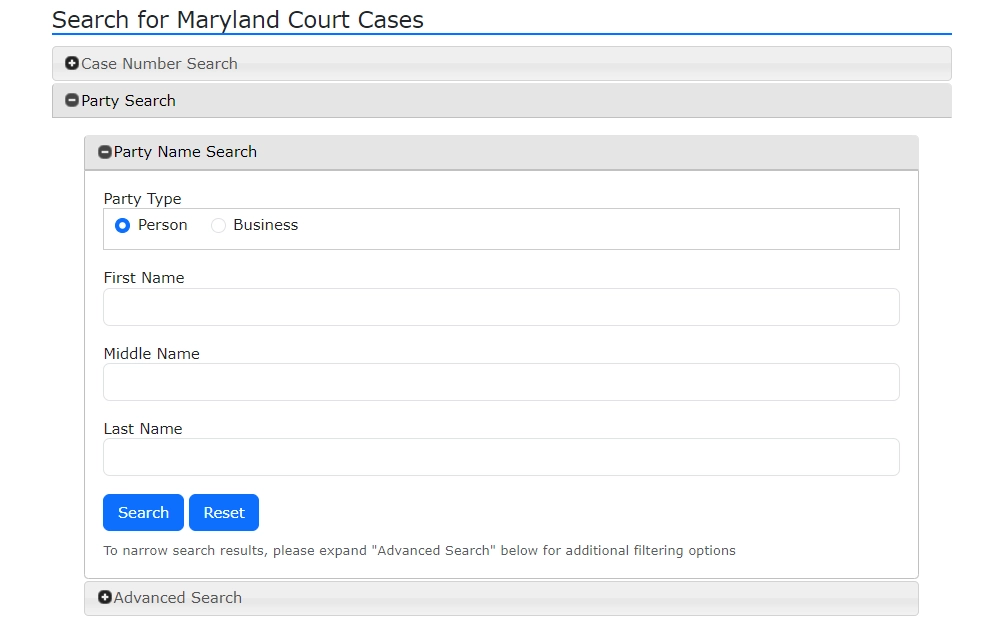
Knowing the location of an incident and the person’s address can help when searching. If you can’t find the specific case using the state court site, you may have better luck contacting the county sheriff’s office where an offense occurred. Federal records are separate from state records, so searchers will need to run a separate check for federal warrants.
How To Run an Online Maryland Warrant Search on Yourself or Someone Else (Free)
Most court records documented within the state are available online through the use of the Maryland Judiciary Case Search website.2 There are exceptions; during criminal proceedings, arrest warrants are usually not available to the public until a suspect is in custody and charged with the crime.
However, those with a court date or summons may also have outstanding arrest warrants related to missed trial dates. Bench warrants issued in these cases do show up on the Case Search site.
It’s important to note that it can take time for information to become available on the website. Call or get in touch with the warrant office in the precinct where the incident occurred for faster access to information.
The Maryland Case Search is free to use. Simply agree to the terms of service and put in an exact name to start searching. Locate either the specific person by providing additional information such as:
- Type of case (civil, criminal, etc.)
- Location of arrest
- Date of arrest
Warrant search results in Maryland will list all individuals with a matching name who’ve been involved in a court case. Each case has complete records, including warrant information.
For example, a search for “John Smith” brings up more than 500 results, with the first reopened, active case involving a bench warrant issued in response to a probation violation. With records from less than a week before the search date posted, case records are kept up to date.
Records show the name of the judge issuing the warrant, the type of warrant and case description and number. Also listed are the court district and type of case, along with the date it was first filed and the current status of the case.
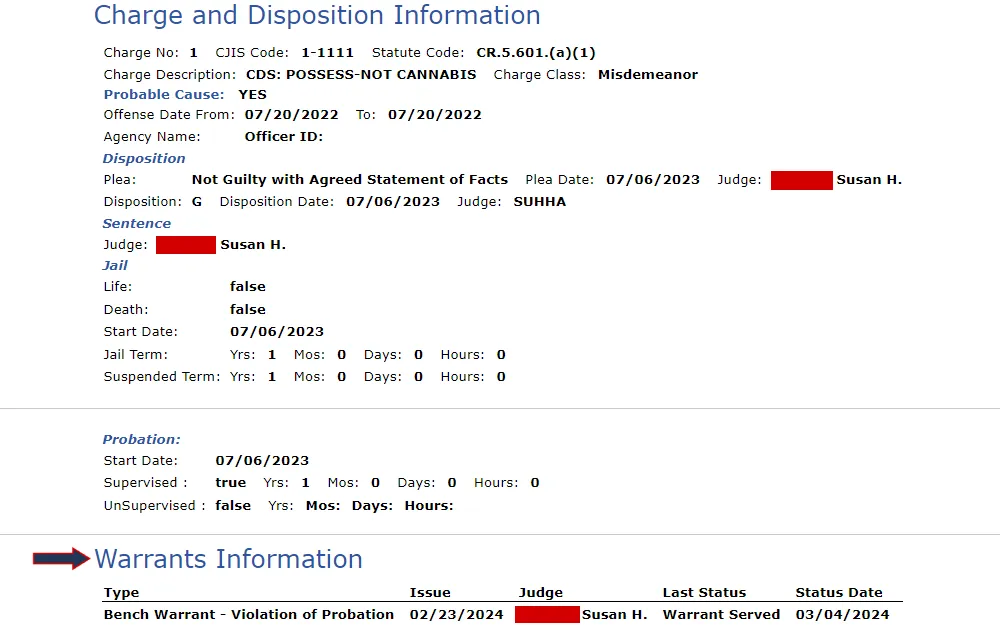
When using the state site to search for warrants, it’s often best to have an idea about which incident might have generated a warrant. People often have multiple records, and knowing which cases are open can help narrow the search.
Government agencies act to collect records responsibly and within legal limits and within legal limits, but millions of residents mean considerable personally identifiable information may be needed to access a specific record.5
Searchers can also request information by mail. The Office of the Clerk of Court handles all in-person and mailed requests for each county courthouse.
For those who opt to do an in-person search, be cautious. Law enforcement officers may arrest anyone with an outstanding warrant who’s doing record searches, so it may be best to have a friend or family member run any in-person searches.
One of the more common reasons that courts issue a warrant is for probation or parole violations. Maryland doesn’t have a statewide fugitive list for those who’ve violated these agreements, but each local district posts a list.
Search for Warrants at the County Level (Courts & Law Enforcement Agencies)
State-level searches through Case Search include warrant information for both District and Circuit courts, regardless of the county.2 However, some counties also have direct offices to assist with a free warrant search in Maryland. Take a look at the process and availability of free warrant information in Maryland’s three largest counties.
Montgomery County: In Montgomery County – Maryland’s most populous county and a Washington, D.C., suburb – there’s no specific online option for obtaining information on outstanding warrants. Instead, searchers can call (240)773-5360 or visit the address below to access Montgomery County warrant information:
Montgomery County Detention Center
1307 Seven Locks Road
Rockville, MD 20854
Anyone with an active warrant who voluntarily enters a detention center or one of the six district police stations serving Montgomery County should expect an immediate arrest. There’s no option for a mail-in search, according to the Montgomery County Department of Police.6
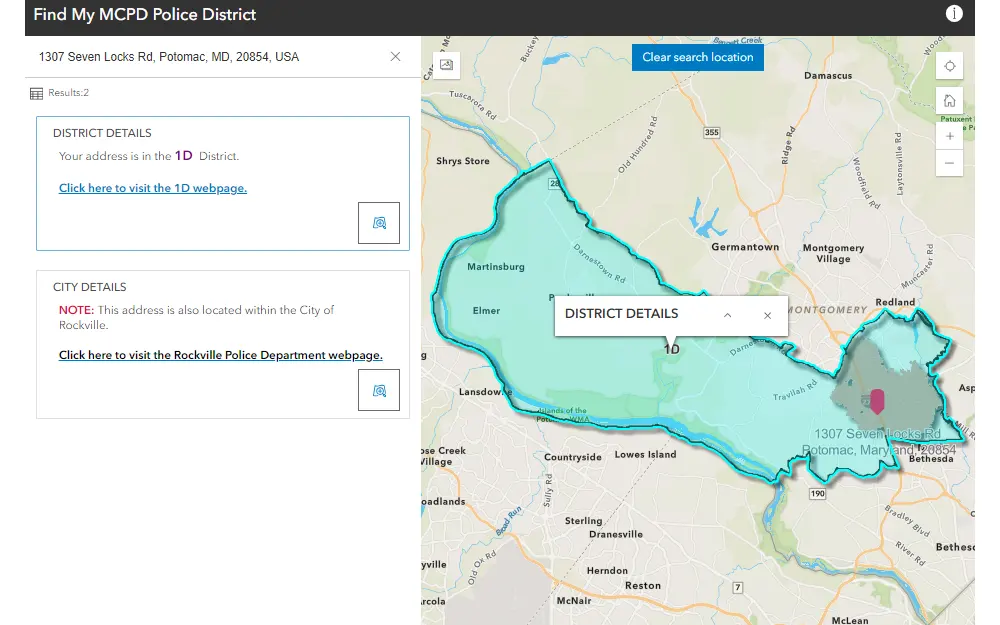
Prince George’s County: Prince George’s County, home to more than 940,000 residents, is the state’s second-largest county. When seeking warrant information, the fastest method is almost always a visit to the Case Search site. All warrant information about currently active cases is posted in the database.
The only exceptions might be sealed cases or warrants about active police investigations that haven’t been served yet. For example, a search warrant may not be publicly posted until after a police search.
Information about warrants is also available through the Criminal Division of the Circuit Court Clerk’s Office. Inquiries may be handled via telephone with a call to (301)952-3344 or in person at
Prince George’s County Clerk of the Circuit Court
Criminal Division
14735 Main Street
Upper Marlboro, MD 20772.
Baltimore County: The county that surrounds Baltimore City is home to approximately 300,000 more residents than those who reside within city limits. The Baltimore County Sheriff’s Office handles all warrants and court processes for the district.8 Police officers deliver court summonses, trial summonses and other legal documents, along with processing and serving arrest, search, bench and other types of warrants.
There’s no independent county website that offers information about outstanding warrants, but the state case search site is where to get started. With a person’s first and last name, anyone can search for open cases and then see if any warrants are active in the case.
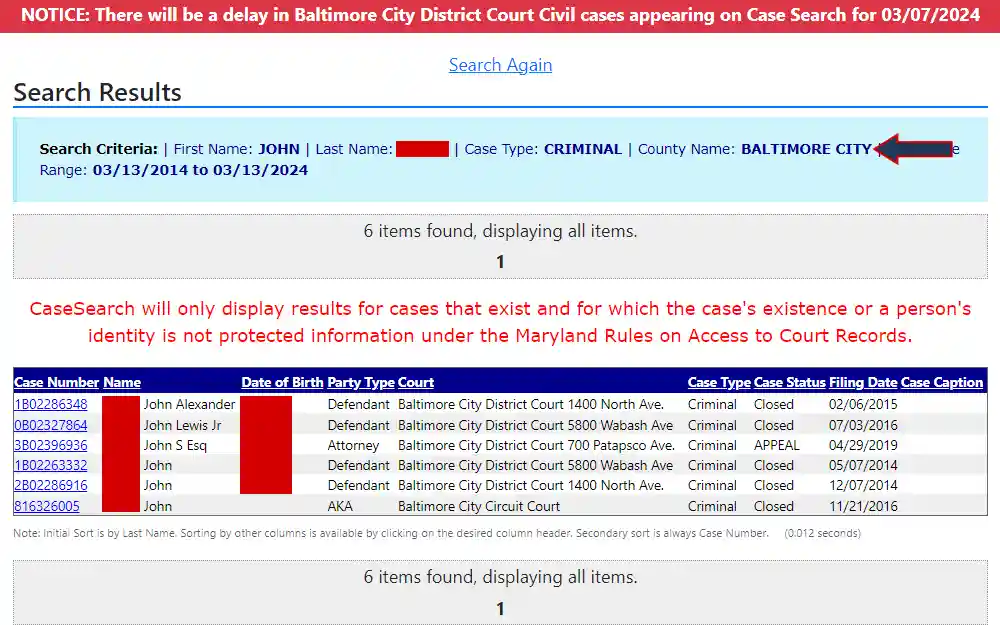
For the most up-to-date information, it’s best to contact the Baltimore County Sheriff’s Office directly at (410)887-3151 or visit the location below in person to obtain details of anyone wanted in Baltimore County.
Baltimore County Sheriff’s Office
County Courts Building
401 Bosley Avenue
Towson, MD 21204
Information may also be available by emailing [email protected]. There’s no fee to access information about warrants, though it costs $60 to have papers served through the sheriff’s department.
Obtain Arrest Warrant Details via Cities & Towns in Maryland
Cities often have their own police force and may offer immediate support on warrant information when you contact them directly.
Baltimore City: In Baltimore City, there’s no city-specific online database to check for outstanding warrants; however, searchers can contact the sheriff’s office regarding child support and criminal warrants by calling (410)396-7591. For general information or to find out more about other types of warrants, call (410)396-1155.
Columbia: While all criminal warrants issued in Columbia are registered with the Maryland Telecommunication Enforcement Resource System (METERS), information isn’t made public.10 METERS is solely available to law enforcement and other government agencies to use while carrying out their public duties.
To find out about open warrants, seekers will need to contact the office that handles that specific type of warrant. To follow up on fugitive, bench and juvenile warrants, contact the Warrant and Fugitive Section of the Sheriff’s Office at (410)313-4174.
Germantown: Located in Montgomery County, those seeking information about warrants issued related to legal matters in Germantown can get access to information via the statewide Case Search site or by calling the Warrants Section of the Montgomery County Department of Police at (240)773-5360.6 In-person visits to turn yourself in are also available at
Montgomery County Detention Center
1307 Seven Locks Road
Rockville, MD 20854.
Waldorf: Waldorf has no specific publicly posted contact information for the Warrant Unit, which handles serving most warrant types in the area; however, researchers can access all information covered under the Maryland Public Information Act, which includes most search warrants. Requests must be submitted in writing to the Charles County Sheriff’s Office Records Section.
Charles County Sheriff’s Office
Records Section
PO Box 189
La Plata, MD 20646
There is an $8 fee for this service. For questions or more information about what to include on an MPIA request, call (301)609-6404.
Silver Spring: Several of Maryland’s largest cities are located in Montgomery County, including Silver Spring. Like other municipalities in this county, county offices handle warrants. The Warrants Section of the Montgomery County Department of Police is the point of contact for the most up-to-date information about active warrants.
To find out about a specific incident or person, call (240)773-5360. You can also turn yourself in for an active warrant.
Look Up Federal Warrants in Maryland & Throughout the U.S.
Several federal agencies also issue and serve warrants. The National Freedom of Information Act (FOIA) sets out requirements for these agencies when members of the public request information about specific events.11 Following the FOIA, the federal government set up the PACER program in 1999.
Public Access to Court Electronic Records (PACER) is a site that allows users to register and access information about all federal legal matters that are available to the public. Some records may be sealed or only available to those with a demonstrated need to know and won’t be available through the PACER database.
The court CM/ECF Lookup Tool allows users to narrow their search criteria by location and court-specific information. There are fees associated with using PACER, but some litigants or searchers may be eligible for an exemption. Call +1-800-676-6856 or email [email protected] for more information.
The FBI, U.S. Marshal’s Service and the Drug Enforcement Agency all maintain most wanted lists which also contain warrant information.12
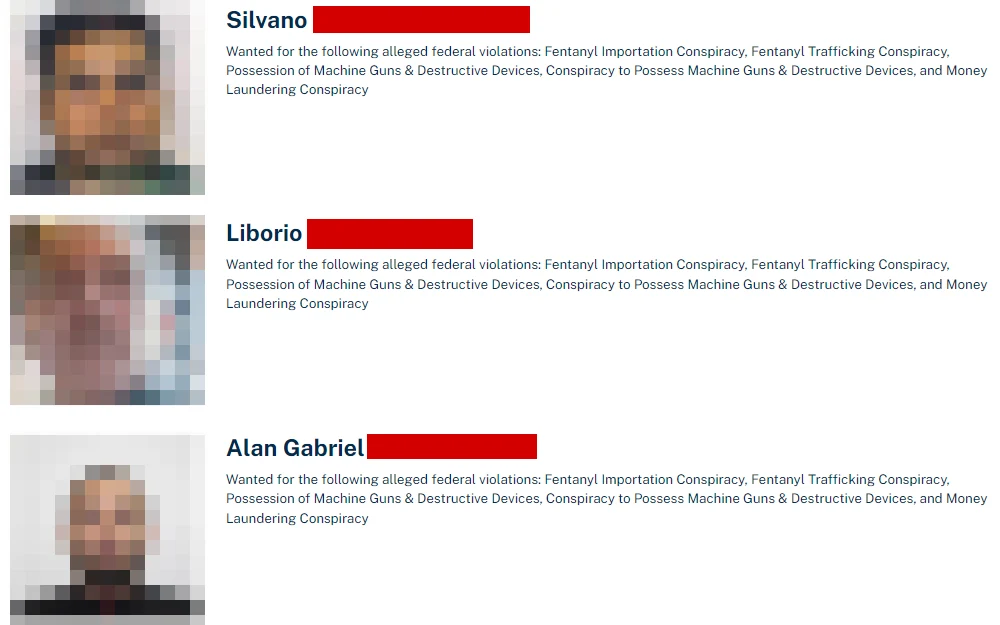
Those seeking help with federal warrants may start their search with the most wanted lists before accessing PACER for broader search options.
Warrant Types in Maryland & What They’re Issued For
While all warrants involve court proceedings, not all warrants have the same weight. There are different types of warrants issued for violations ranging from traffic citations to bench warrants issued for missed jury duty summons.
Some of the most common types of warrants to show up on a warrant search for Maryland are listed and briefly explained below.
- Arrest Warrants: These are typically issued following a criminal investigation. They may be for a misdemeanor or felony.
- Bench Warrants: Most commonly, bench warrants are issued for a failure to appear. Any missed trial date, as a witness or a defendant, can lead to a bench warrant.
- Probation & Parole Violation Warrants: All released convicts who have a parole or probation agreement with the state must meet certain requirements. Failure to do so means a revocation of the agreement, and the individual may be returned to jail to serve their remaining sentence.
- Traffic Warrants: Some traffic violations are considered criminal. DUIs, reckless driving and hit and runs are all examples of incidents that may ultimately result in traffic warrants.
- Child Support Warrants: Failure to pay child support will eventually lead to a warrant issued for the arrest of the noncompliant parent.
- Fugitive Warrants: Those who fail to appear at their criminal trial are considered fugitives, and arrest warrants may be handled by agencies such as the U.S. Marshals if the accused has left the original jurisdiction.
- Search Warrants: Judges issue search warrants to enable police officers to gather evidence during an active investigation.
- Capias & Capias Pro Fine Warrants: These warrants are issued when someone fails to pay court-ordered debts. A judge may issue these warrants to have the debtor brought into court to explain the situation. If the explanation isn’t acceptable, it may result in jail time.
Clearing Warrants Issued in MD & Reporting Wanted Persons
If you or someone you know has a warrant out for their arrest, immediate action is necessary. If you feel safe doing so, you can notify the person with the outstanding warrant. They can then make arrangements to turn themselves in or seek legal counsel first to handle the turnover.
If there’s a safety concern, you can submit a tip online or by calling 1-866-7LOCKUP to contact Metro Crime Stoppers Maryland.13 Tips are anonymous, and the tip line is available 24-7.
Depending on the type of warrant, you may be able to address it by paying outstanding fines or contacting the issuing court for more information. Setting a court date is often enough to pause a bench warrant. If your case is more involved, get an attorney and legal advice on the next steps.
If you opt to turn yourself in, be sure to have legal counsel and a bail bondsman set up to help. You’ll also want to tell your family ahead of time if you see any activity on your free Maryland warrant search to avoid surprise police interactions.
Find further details on anybody in the state by following the guidance of the Maryland free public information lookup tutorial (for insights into probationers, parolees, court proceedings, background checks, etc.) as well as the instructions for accessing MD arrest and criminal records.
References
1Maryland Attorney General’s Office. (n.d.). Maryland Public Information Act. Retrieved March 13, 2024, from <https://www.marylandattorneygeneral.gov/pages/opengov/pia.aspx>
2Maryland Judiciary. (n.d.). Maryland Judiciary Case Search. Retrieved March 13, 2024, from <https://casesearch.courts.state.md.us/casesearch/>
3Maryland Judiciary. (n.d.). Search for Maryland Court Cases. Maryland Judiciary Case Search. Retrieved March 13, 2024, from <https://casesearch.courts.state.md.us/casesearch/inquiry-search.jsp>
4Maryland Judiciary. (2024). Case Detail. Maryland Judiciary Case Search. Retrieved March 13, 2024, from <https://casesearch.courts.state.md.us/casesearch/inquiryDetail.jis?caseId=D09CR23001351&loc=34&detailLoc=ODYCRIM>
5Maryland Attorney General’s Office. (2023). Maryland Public Information Act Manual. Retrieved March 13, 2024, from <https://www.marylandattorneygeneral.gov/opengov%20documents/pia_manual_printable.pdf>
6Montgomery County Police Department. (n.d.). Warrants. Retrieved March 13, 2024, from <https://www.montgomerycountymd.gov/pol/howdoI/warrants.html>
7Montgomery County Police Department. (n.d.). Find My District. Retrieved March 13, 2024, from <https://www.montgomerycountymd.gov/pol/districts/find-my-district.html>
8Montgomery County Sheriff’s Office. (n.d.). Service of Process. Retrieved March 13, 2024, from <https://www.baltimorecountymd.gov/departments/sheriff/service-process>
9Maryland Judiciary. (2024). Search Results. Maryland Judiciary Case Search. Retrieved March 13, 2024, from <https://casesearch.courts.state.md.us/casesearch/inquirySearch.jis>
10Maryland Capitol Police. (2016, April). METER/NCIC – Directive 3 – 109. Retrieved March 13, 2024, from <https://mcp.maryland.gov/Directive%20Manual/3-109.pdf>
11U.S. Department of Justice, Office of Information Policy (OIP). (n.d.). Freedom of Information Act: Frequently Asked Questions (FAQs). FOIA.gov. Retrieved March 13, 2024, from <https://www.foia.gov/faq.html>
12United States Drug Enforcement Administration. (n.d.). Most Wanted Fugitives. Retrieved March 13, 2024, from <https://www.dea.gov/fugitives>
13Metro Crime Stoppers of Maryland. (n.d.). Submit A Tip. Retrieved March 13, 2024, from <https://metrocrimestoppers.org/submit-a-tip/>
